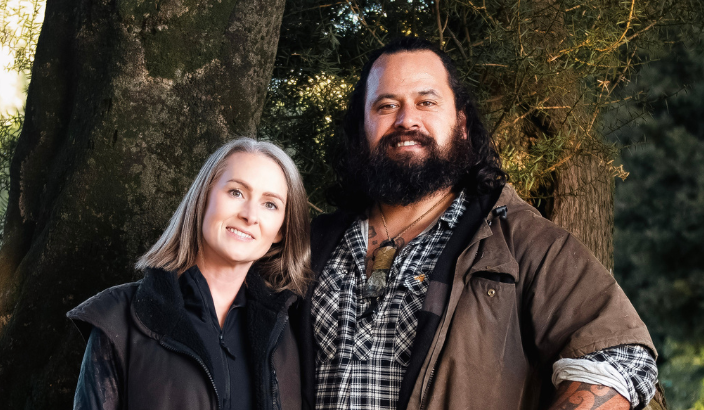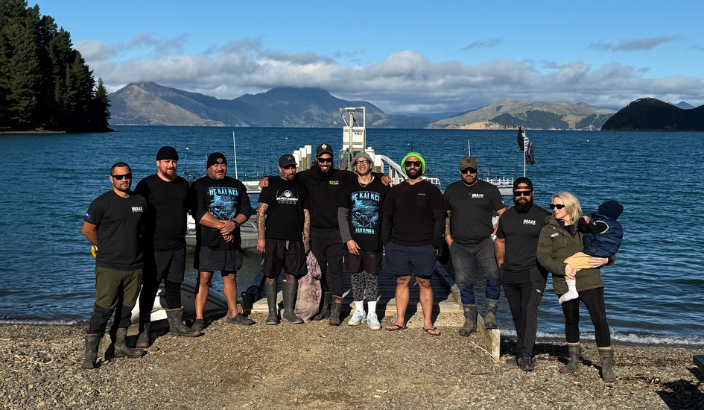Bringing it all to the table

Adrienne and Shannon Thompson are empowering rangatahi through hands-on kai gathering. Photo: Ahurei Visual
Through their non-profit initiative He Kai Kei Aku Ringa – ‘providing kai by my own hands’ – Adrienne and Shannon Thompson are reconnecting rangatahi across Aotearoa with the natural world and with their own potential. By teaching food gathering and life skills, the couple are doing more than feeding hungry stomachs – they’re building confidence, community, and brighter futures, as Alistair Hughes finds out.
Adrienne and Shannon have found a way to empower and improve the prospects of young people from all over New Zealand through the ageless phrase: ‘food is life’.
They established He Kai Kei Aku Ringa (‘providing kai by my own hands’) five years ago and, since then, have run specially designed, non-profit wānanga (short courses) to reconnect youth with te taiao, their natural environment, and teach the basic skills of gathering and preparing kai from the whenua, awa and moana (land, rivers and ocean). Individuals of all ages are taught to become capable in hunting, diving, fishing, foraging, and food preparation.
The origins and outcomes of this revolutionary initiative are far-reaching and more vital to modern life than is first apparent, as Adrienne explains, “We had identified a need, because there wasn't heaps of capability here in Te Tauihu (the top of the South Island), especially amongst our whanau Māori, to gather kai from the land and the ocean – and yet we're such a resource rich area.”
Adrienne and her husband Shannon knew from their own experiences that, tragically, a lot of youth crime stems from basic hunger.
“Kids are sometimes not having their basic needs met, so giving them the skills, power and capability to be able to feed themselves and their family, and to earn a place in their whānau and their communities, is where He Kai Kei Aku Ringa bases its values.”
The couple both grew up in Auckland and discovered the challenges our young people face transitioning to adulthood first-hand.
“Shannon had a tough upbringing, moved from place to place throughout his childhood and didn't really have a grounded home or family,” Adrienne explains. “He ended up stealing because he and his siblings were hungry.”
His life began to turn around when primary school teachers arranged for him to attend a private boarding school. While there, he came into contact with other families who showed him the value of responsible parenting and how well a home environment can work with everyone contributing together.
“There were a lot of guys that I grew up with in Papakura that didn't have the opportunity that I had,” acknowledges Shannon. “A couple of them are now in gangs. They were kids that didn't get to choose what environment they were born into; they were just dealt that hand.”
At 17, Shannon entered the military and began a successful career, which saw him retire as an SAS patrol commander in late 2021. The skills he gained there would prove invaluable in his and Adrienne’s venture.
“Gathering food with our own hands and understanding what that means is just a small piece of the puzzle,” he says. “There is a lot in this world that can contribute to creating a confident human with some form of skills, and what we can offer is just one of them.”
Adrienne’s own story contrasts sharply with her husband’s – but there are similarities as well.
“I grew up in a good, supportive family, but I did not transition well,” says Adrienne of her background. “I got pregnant at 19, and it took me probably a good seven or eight years to move onto a positive trajectory and really become a functioning member of society.”
With a growing family, she was already working informally with young people and gained management expertise as CEO of a philanthropic foundation in Auckland. She and Shannon moved to Nelson in 2020 to begin formally establishing He Kai Kei Aku Ringa.
The first wānanga was held in 2021, and the couple realised pretty quickly that they were offering an opportunity which many young people and their families had been looking for.
“When we put our pānui out, we had eight spaces and we got 250 applications, from all over the country,” recalls Adrienne. “So our biggest initial challenge was being able to offer this opportunity to all the rangatahi (younger generation) who wanted it.”
This quickly grew into regular, seasonally appropriate wānanga of all lengths – from weekend and week-long courses to extended programmes running over several months. Both believe that there is a real need for people of all ages to reconnect with te taiao and have seen broader advantages flow from this opportunity.
“This building of skills and capability empowers people - competence builds confidence,” says Adrienne. “Two rangatahi in particular, who came on our very first wānanga, return every year and we see them become these really confident, consistent, strong and capable individuals. It’s a beautiful, exciting thing to see. And now they move through life having more of a plan about what's next. And that's a big one.”
Shannon is in full agreement, having experienced what many of these young people face.
“This by-product of our programme is so beneficial – not only for the individual, but for the people they are surrounded by. Being introduced into an environment which they would potentially never have encountered can change the trajectory of their lives.”
His childhood friends now living the gang lifestyle are apparently great supporters of what he and Adrienne have achieved so far. One recently messaged: “I'm really proud of you Shannon, big ‘ups’, man, for what you're doing.”
But Shannon feels regret that other options weren’t open to them.
“I know that there are still children growing up like I did, having to turn to crime to service the basic needs of food. So if I can change one life out of a group of people each time, divert one person's life from going in that direction, then that's my reward.”
Adrienne also believes strongly in the unintended consequences of He Kai Kei Aku Ringa.
“Whakawhanaungatanga (relationship-building) grows between people who spend time together on wānanga, people that they wouldn't have necessarily met otherwise.”
Participants find themselves challenged and in situations that are not meant to be easy – pitched against the elements, walking long distances, attempting difficult tasks while wet, cold, and hungry.
“And so they build really awesome bonds, which are quite unbreakable, when they do these hard things together. I think the gathering kai is just the waka for all those bigger skills and attributes.”
He Kai Kei Aku Ringa has faced its own challenges, from funding (although much of which was initially self-financed by Adrienne and Shannon) and gaining the trust of other stakeholders.
“Lots of relationship building has been required,” Adrienne confirms. “That's probably been key – with landowners, local business owners, community groups, different government organisations, with funders and iwi.”
Shannon has whakapapa to this region so feels a deep sense of responsibility to the land and its people.
“I guess it is still a case of understanding and trusting who we are and trusting in Shannon, that he's the right person to do this, because there is a level of risk involved.”
Any challenging outdoor pursuit requires careful planning, and his extensive military experience should certainly allay many fears in this area.
“But some people will still probably never really get it,” laments Adrienne, “why what we do is important and worth the commitment. And then there's other people who tell us: ‘This is everything that we need, for our kids to understand and know where their kai comes from and be out connecting with te taiao’.”
Going forward, the couple want to broaden the scope of what He Kai Kei Aku Ringa can offer and have identified a further area where young people may need guidance.
“When our youth are starting to transition from school into the workforce or further education, it can be really scary – not just for them, but their whānau and their communities,” says Adrienne.
“It's a vulnerable space for our rangatahi, our teenagers, these days,” adds Shannon, “with social influences and the internet bringing a false perception of reality and success.”
They intend for their programmes to still centre around kai gathering as the waka for skills and learning but are going to incorporate other aptitudes as well.

“We are also going to be introducing more work around the ‘soft’ skills,” explains Adrienne. “Communication, CV development, financing, hauora (wellbeing), taking care of yourself, sleeping and eating well, moving your body, getting up on time, going to work every single day – all the basics of living a positive, independent adult life.”
Adrienne is aware of the viewpoint that this should be the responsibility of parents and whānau, but also knows that this is not always the reality – and doesn’t believe it’s fair to hold certain young people to the same standard if they haven’t had the privilege and right of receiving this foundation.
“So we're going to create a place where they will come and learn all of that, and we're going to do our very, very best to hold them tight and carry them through into their adulthood successfully.”
He Kai Kei Aku Ringa looks set to provide our region’s youth with more nourishment than can simply be placed on a table, preparing them for life ahead while challenging the rest of us with much needed food for thought.
